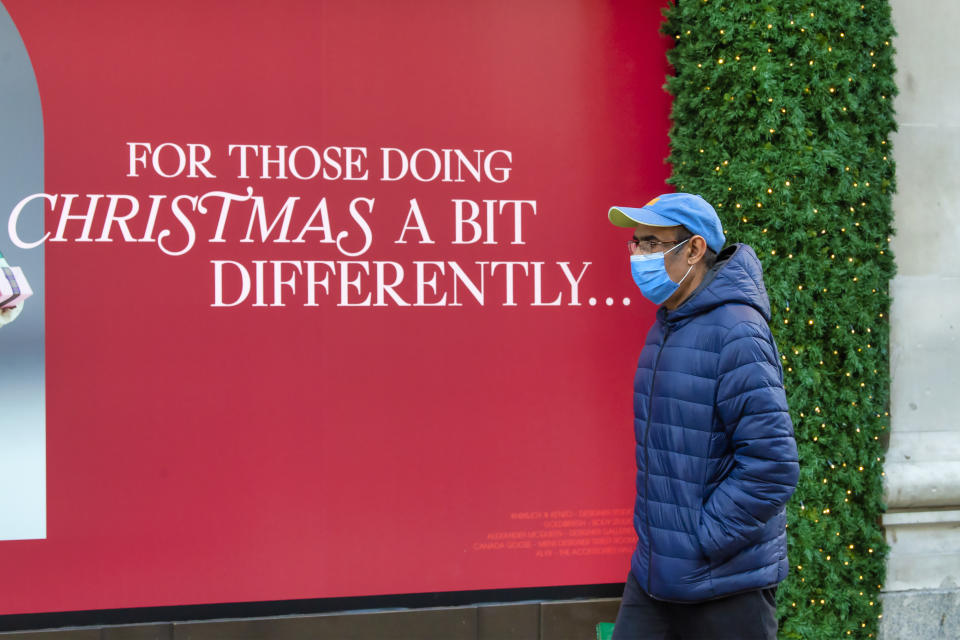UK consumer spending and footfall slide as shops close just before Christmas

UK consumer spending dropped for the first time in three months in October, as rising coronavirus rates and restrictions curbed everyday life in parts of the country.
Barclaycard data shows spending fell 0.1% year-on-year, in a stark reversal of the 2% growth seen a month earlier.
It comes as retailers warn they stand to lose £2bn ($2.63bn) in sales a week this month because of lockdown restrictions in England alone, with the most recent footfall data showing steep declines.
Barclays (BARC.L) released figures laying bare the country’s spending habits on Tuesday, with the bank reporting it sees almost half of all UK credit and debit card transactions.
Even before England’s lockdown, spending on ‘non-essential’ items fell 1.7% year-on-year in October across the UK, compared to 0.6% growth the previous month.
Watch: Londoners headed to the shops before second English lockdown
Spending on travel saw some of the steepest declines, down 68% overall. Cash spent plunged by 78.2% on travel agents, and 75.3% on plane fares.
Barclaycard’s ‘entertainment’ category saw 46.5% declines in spending, with hospitality and leisure spending down 37.8% and restaurant spending down 32.7%.
Separate data released by Springboard on Monday provided a glimpse of the dire month ahead for bricks-and-mortar retailers amid tightened restrictions in England and other high-alert areas of the UK in November.
Footfall nosedived by 61.6% between Thursday, when lockdown was imposed in England, and Saturday across shopping centres, retail parks and high streets.
READ MORE: UK unemployment rises at fastest pace since 2009
But Springboard noted a brief surge in spending in preparation for the lockdown in the days leading up to the curbs, with footfall up 11.7% week-on-week as consumers stocked up.
Many retailers enjoyed a strong October, however, with analysts reporting that curbs on hospitality, leisure, entertainment and travel were boosting retail spending.
Barclaycard data shows a 2.5% rise in ‘non-essential’ transactions year-on-year, with total spending down only 1.7%.
“Boosted by early Christmas shoppers, general retailers and catalogues saw growth of 50% in October,” noted Barclaycard’s latest report.
“Spend on digital content saw its highest uplift, 32.3%, since the first national lockdown eased in July, while takeaways stayed strong at 18.3% growth, as many embraced dining in with a box set.”
Separate data from the British Retail Consortium (BRC) showed total sales up 4.9% annually in October.
Watch: Cardiff city centre ‘busy’ as Welsh lockdown ends
Chief executive Helen Dickinson said: “October saw another month of strong sales growth, with food, gifts and loungewear high on peoples’ shopping lists. Tightening restrictions across the United Kingdom and speculation towards the end of the month of an England-wide lockdown prompted customers to stock up on home comforts and food supplies.”
But she noted non-food retailers saw double-digit declines in sales as home working further hammered activity, widening the gap with online sales.
She warned: “The new lockdown in England will now throw away this progress as we enter the crucial Christmas trading period and we estimate that £2bn of sales per week will be lost this month.
“It is therefore vital that retailers are able to trade from 3 December and we are asking government to urgently provide clarity about the criteria for reopening and to ensure that affected businesses are supported in the coming months.”

 Yahoo Finance
Yahoo Finance 